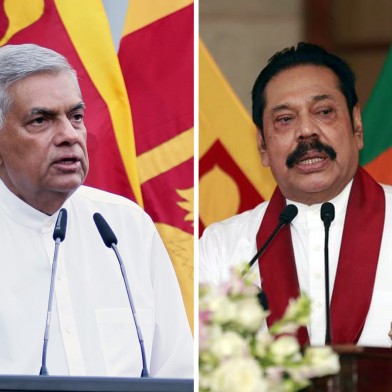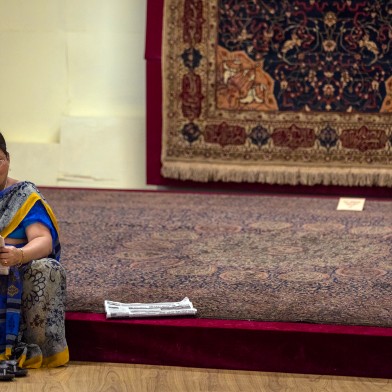In October, Sri Lanka hosted a major international conference on the Indian Ocean region.
The “Indian Ocean: Defining our Future” conference took place just weeks before Sri Lankan President Maithripala Sirisena ousted Prime Minister Ranil Wickremesinghe.
New Zealand was represented at the conference by Joanna Kempkers, New Zealand High Commissioner to India, Sri Lanka and Bangladesh, and Victoria University of Wellington international relations specialist Manjeet Pardesi.
The Asia Media Centre spoke to Dr Pardesi about what was discussed in the conference.
* * *

The ‘Indian Ocean’ as a regional identity does not yet quite exist, says Manjeet Pardesi. (Photo: Pixabay)
What were the broad themes of the conference?
Manjeet Pardesi: “It was all about emphasising the importance of the Indian Ocean and Sri Lanka’s centrality in that. There were four themes: economic development, security, sustainability and international law.
“It was a very high-level event. By the Indian Ocean, they mean South Asia, the Persian Gulf, East Africa, Australia and Southeast Asia.
“More than 50 states were present – about 28 Indian Ocean littoral states plus what they call ‘Indian Ocean users’. New Zealand was in there in our capacity as one of the users of the Indian Ocean.”
What were the key issues that emerged?
“My takeaway was there’s the feeling that whatever is happening in the South China Sea – as the whole concept of the Indo-Pacific takes off, and as China enters the Indian Ocean region as well – we may see some sort of great power rivalries play out in the Indian Ocean.
“The general theme was: we are now in the middle of a benign environment in the Indian Ocean, but the Indian Ocean remains extremely under-institutionalised.
“The Sri Lankans want to use this period of relative benign environment to set up some sort of an institution or architecture in the region – if not to keep the great power rivalries away, at least to manage them if and when they do emerge in the region.
“There was also a lot of talk about a situational awareness as far as the navies of region are concerned.
“It was noted that at any given point in time, there are 120 navy vessels in the Indian Ocean from about 20 countries. What they want is some sort of mechanism for maritime domain situational awareness, so everyone knows where everyone else is and there are no surprises. They don’t want events like there have been in the South China Sea.”

Sri Lanka is trying to put the the civil war behind them and show the world they are open for business, says Manjeet Pardesi. (Photo: Pixabay)
What was Sri Lanka’s interest in holding the conference?
“It was a major diplomatic feat getting these 50-plus countries to be present. I think what’s going on there is a couple of things.
“Sri Lanka is trying to project this image of itself: the civil war is now over and Sri Lanka is open for business, ready for take-off.
“How do they create an economic policy that helps them with this? What they are trying to emphasise in their emerging economic model is the whole Blue Economy dimension. It’s all about sustainability and maritime transportation and connectivity, about Sri Lanka being this economic hub, in the middle of the Indian Ocean.
“There’s also this desire for Sri Lanka to place itself as an intellectual hub. In his opening remarks, the Sri Lankan Prime Minister at the time [Ranil Wickremesinghe] said, among other things, that what they want for the region is freedom of digital connectivity. A global telecommunications structure depends on undersea submarine cables.
“The Sri Lankans say there isn’t a centre that studies the security of these cables and issues to do with management of these cables. They want to set up such a centre in Sri Lanka.
“My personal takeaway also is that we are in the middle of regional configuration and re-configurating our traditional understandings of boundaries – the Indo-Pacific is one such term thrown around.
“As the US and Japan and others emphasise the Indo-Pacific, and as India looks east, I have a feeling Sri Lanka wants to emphasise their Indian Ocean-ness as opposed to their South Asia-ness, as they try to carve out a niche for themselves.
“It should be noted that Indian Ocean-ness versus South Asian-ness is not an either/or identity; instead it is a matter of emphasis.”
“As a state, New Zealand is interested because New Zealand uses sea lanes in the Indian Ocean for trade and energy. If some institutionalised architecture emerges, we need to be on top of things.”
MANJEET PARDESI
—
What is the Indian Ocean’s potential?
“Several speakers argued the Indian Ocean is now the new global economic growth pole. They argued that the 28 countries in Indian Ocean region will grow at 5.8 percent GDP per annum for the next couple of years, which is higher than projections of 3.6 to 3.9 percent for the global economy.
“The argument was that we need to take a better look at this region because this is where growth is concentrated. That’s why we need to set up some sort of institutionalised architecture.
“Personally, I don’t doubt this region will grow in terms of statistics. But I’m not sure this is a coherent economic entity just yet.
“In that sense, one of the themes of this conference was to create some sort of Indian Ocean identity. Many countries, from South Africa to Australia and Sri Lanka, are talking about an Indian Ocean identity ‘out there’ as it does not quite exist yet, even as all of these states border the Indian Ocean.”

New Zealand will open a High Commission in Colombo in 2019. (Photo: Pixabay)
New Zealand is due to open a High Commission in Colombo in 2019. What kinds of issues were discussed at this conference that New Zealand should be watching?
“New Zealand is looking at an FTA to some degree with India, Sri Lanka, in the Indian Ocean region, so it is good to follow what’s happening in this region more broadly.
“When it comes to the existing institutions, New Zealand is not a member because New Zealand is not an Indian Ocean state. New Zealand is not a member of the Indian Ocean Naval Symposium, for instance.
“But if they want to include maritime domain awareness, this is an area where New Zealand has expertise. We have the fourth-largest exclusive economic zone (EEZ) in the world, and I think our area of search and rescue is even larger.
“In the context of creating security institutions, maritime domain awareness was at the top of the agenda because it’s under-utilised. But they also spoke about HADR (humanitarian and disaster relief) search and rescue, and anti-narcotics, and so on. There are complementarities between the South Pacific and the Indian Ocean in these areas. We could use those to build up links.
“Also, if this is going to be the fastest growing economic region in the world, it’s helpful to understand how these markets work.
“It was noted that the region is different from other regions in a purely economic sense. Most of the trade that traverses the Indian Ocean only passes through these waters. It neither originates in the Indian Ocean, nor is it destined for markets in the Indian Ocean, perhaps with the exception of energy resources from the Persian Gulf.
“As a state, New Zealand is interested because New Zealand uses sea lanes in the Indian Ocean for trade and energy. If some institutionalised architecture emerges, we need to be on top of things.
“And Sri Lanka is definitely looking to take a lead in this discussion.”
Manjeet Pardesi is Senior Lecturer, International Relations at the Victoria University of Wellington. His attendance at the conference in Sri Lanka was funded by the Asia New Zealand Foundation.
– Asia Media Centre


